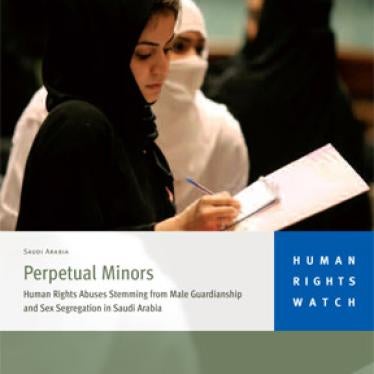Embassy of Canada
Diplomatic Quarter
Riyadh, Saudi Arabia
Dear Consul,
I am writing to urgently request your assistance in helping Ms. Nazia Quazi, an unmarried 24-year-old dual Canadian and Indian national, to leave Saudi Arabia and return to her home in Canada. The following account comes from an interview with Ms. Quazi conducted by Human Rights Watch on November 25, 2009.
Ms. Quazi arrived in Saudi Arabia on November 23, 2007 for a brief visit with her father, Mr. Quazi Malik Abdul Gaffar, an Indian national who currently lives and works in Saudi Arabia. According to Ms. Quazi, Mr. Abdul Gaffar has since forced her to remain in Saudi Arabia against her will by confiscating her Canadian and her Indian passports, and other identification documents such as her driver's license and her credit cards.
Ms. Quazi entered the Kingdom on her Indian passport with a visit visa valid for three months. She informed Human Rights Watch that her father took her to have a medical exam whose purpose she did not understand until it became clear that it was necessary for sponsorship purposes. In Saudi Arabia, all foreigners wishing to enter the country to live there, visit, or work, must have a local sponsor or guarantor who undertakes all administrative paperwork on behalf of them. Mr. Abdul Gaffar is Nazia Quazi's sponsor and he renewed her sponsorship until November 2010.
On 8 November 2009, Ms. Quazi applied for a limited validity passport at the Canadian Embassy in Riyadh, where consular officials informed her that because her only proof of identity is a photocopy of her Canadian passport, the embassy may not be able to issue her a new passport. According to Ms. Quazi, even if she were to obtain a new Canadian passport, she says that representatives at the Canadian Embassy, the Indian Embassy, and the Saudi Passport Office all told her that she would still require her father's authorization to obtain an exit visa to leave the country.
On October 28, 2009, Ms. Quazi received an emergency certificate from the Indian Embassy which is only valid until January 2010, but was told that she must obtain her own exit visa, which is arranged at the Passport Office by the person's sponsor, in this case Ms. Quazi's father.
Ms. Quazi informed Human Rights Watch of a history of abuse by her parents. According to her, she says that her mother has emotionally abused her and that her father has been physically violent towards her, before and after her arrival in Saudi Arabia. She says that in July 2008 he held a knife up to her neck and threatened to kill her if she tried to leave the country. According to Ms. Quazi, her father in June 2009 tried to force her to marry someone she does not know. She refused to marry and ran away from her father's home. Nazia's mother still lives in Canada with her two sons, 21 and 25 years old,. According to Ms. Quazi, her mother supports her husband's decision to keep their only daughter in Riyadh indefinitely.
Human Rights Watch wrote a letter to the Saudi Human Rights Commission on December 21, 2009 urging them to directly intervene in this case. Ms Quazi has also contacted the Commission, but the Commission has indicated that it may not be able to provide her with any assistance.
Because Ms. Quazi's safety is at stake we urgently request that the Canadian Embassy in Riyadh take appropriate measures to protect her until such time as she has the documents and arrangements in place to exit the Kingdom, and also during her trip to the airport and her departure.
We thank you for your assistance and look forward to your cooperation in this very urgent matter.
Sincerely,
Liesl Gerntholtz
Director, Women's Rights Division
Human Rights Watch







